Movie Review – Noah
Heady, concussive attempt to bring the Noah’s Ark story to life, with a gamely led cast doing their best to elevate some uneven and often pedestrian material. The film looks amazing, at the very least. Visually striking, Noah is unfortunately unable to really tap into the divine elements of this early Old Testament story in a way that’s as impactful as it really needs to be. Still, it’s entertaining to a large degree, so there’s that.
– Summary –
Director : Darren Aronofsky
Year Of Release : 2014
Principal Cast : Russell Crowe, Jennifer Connelly, Ray Winston, Emma Watson, Logan Lerman, Anthony Hopkins, Douglas Booth, Leo McHugh Carroll, Frank Langella, Dakota Goyo, Marton Csokas, Madison Davenport, Nick Nolte, Mark Margolis, Kevin Durand.
Approx Running Time : 138 Minutes
Synopsis: God. Ark. Flood. Animals. Noah.
What we think : Heady, concussive attempt to bring the Noah’s Ark story to life, with a gamely led cast doing their best to elevate some uneven and often pedestrian material. The film looks amazing, at the very least. Visually striking, Noah is unfortunately unable to really tap into the divine elements of this early Old Testament story in a way that’s as impactful as it really needs to be. Still, it’s entertaining to a large degree, so there’s that.
**********************
In the beginning, God created Hollywood’s version of the Bible.
Hollywood loves a good biblical epic. While the rise of secularism in society has pretty much made Hollywood staunchly cautious about a film centering on a story from either Testament, occasionally a film like Noah, or The Passion Of The Christ, sneaks through into the mainstream. Noah’s Ark, one of the oldest stories in the Bible, is basically the tale of God hitting reset on humanity – in the time of Noah, people constantly fought, belittled and argued with each other, engaging in all manner of debauchery and depravity for their own pleasure (or pain)….. wait, so….. kinda like us now, right? Ahem. Anyway, God decides to send enough rain to flood the world, and tasks one dude and his family with building an enormous boat, filling it with all manner of animals (except unicorns and dragons, because nobody f@cking likes them, eh?) and sailing on until striking land again, much like Kevin Costner appropriated for Waterworld. We’ve kinda seen a Noah story already this century, with Evan Almighty, although one got the sense through that film that the word of God wasn’t exactly foremost in the minds of the film-makers, especially when a good laugh could be had. No, the story of God wiping us all out doesn’t lend itself to comedy, so naturally if you’re making a film you want to be completely unfunny, you hire two actors who have absolutely zero comedic timing in their repertoire – Russell Crowe and Jennifer Connelly. Noah, directed by Pi and Requiem For A Dream maestro Darren Aronofsky, is a full-bore biblical epic – albeit without much reference to the core text – that goes for gritty, muddy sensationalism rather than stagey, studio-bound stateliness a la Charlton Heston’s famous descent from the mountain carrying those two “rock” tablets. So is this biblical story one for the ages? Or does it miss the point of the Old Testament story, washing away the reason for the story in pursuit of gleeful destruction and rampant visual effects?
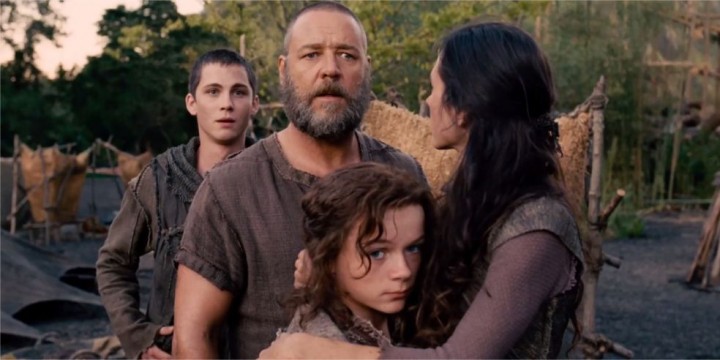
Noah (Russell Crowe) is haunted by bad dreams about an oncoming flood, driven by The Creator’s desire to purge the world of its blossoming sin. Noah’s wife, Naameh (Jennifer Connelly), his sons Shem (Douglas Booth), Ham (Logan Lerman) and Japheth (Leo McHugh), together with Shem’s barren wife Ila (Emma Watson) and a collection of fallen rock angels known as The Watchers, build an enormous ark to house the survivors of an oncoming flood, as decreed by the omniscient Creator (God). A descendent of Cain, one of the sons of Adam, Tubal-cain (Ray Winstone), and his army of marauding sinners, want the ark for themselves, lest they too be destroyed. Noah’s grandfather, Methuselah (Anthony Hopkins) lurks at the top of a nearby mountain, content to leave the woes of humanity to those younger than he.
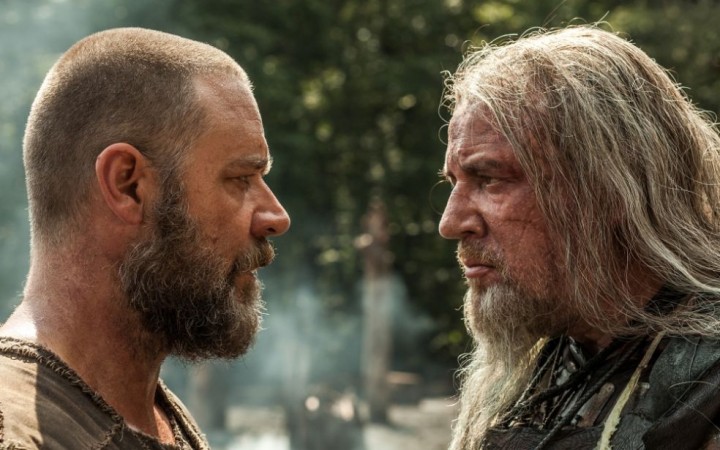
If you think you know the story of Noah, this film will most likely be an eye-opener. While flood narratives have long been present throughout history, including Sumerian, Islam and Christianity (the latter being the most familiar to Western audiences), factual, literal evidence of any kind of ark have yet to be found by scientists or explorers (though not for lack of trying). Depending on your beliefs, Noah will be either a highly fanciful fantasy epic, or an indelibly controversial and evocative version on the story as presented in the Old Testament. I’m not here to espouse the wisdom of Aronofsky’s blank-slate re-appropriation of Noah’s flood-based theology, or an apparent reluctance to really nail the Christian thematics of the story – I’m guessing the film was marketed to be as inclusive as possible to all audiences, regardless of faith – but as a story of a man destined to save the world through its utter ruin, this film is a gallant effort. Does it succeed? Yes and no; Noah is a dense film filled with subtext, moral and ethical dilemmas and a slew of gritty, determined character arcs, not all of which are handled exceptionally well, so those looking for an examination of God’s word and His promise to never flood the Earth again as a religious event might be left wanting.
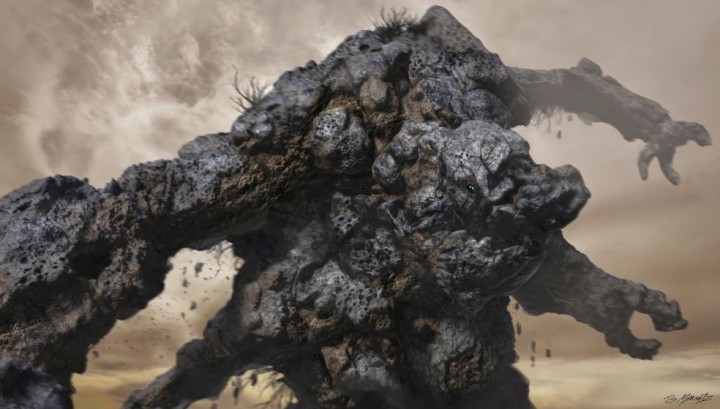
Noah struck me as a version of the story blinkered through the same sweaty, earthy tension of that Survivor television series. There’s nothing likeable about Noah’s visual aesthetic in the opening half, with a desolate earth-scape evaporating any sense of hope or love. The desert, such as it is, is a hopeless place, and the people aside from Noah’s family are generically evil and cruel, defying the will of the Creator (the film never mentions God by name, instead using this rather nonspecific nomenclature), leaving Noah himself to provide the film with it’s own version of a “hero”, bringing light into an otherwise dark and horrifying world. It’s a precursor to medieval life, this film, and by its very nature provides a sense of isolation for the characters, both literally and figuratively.
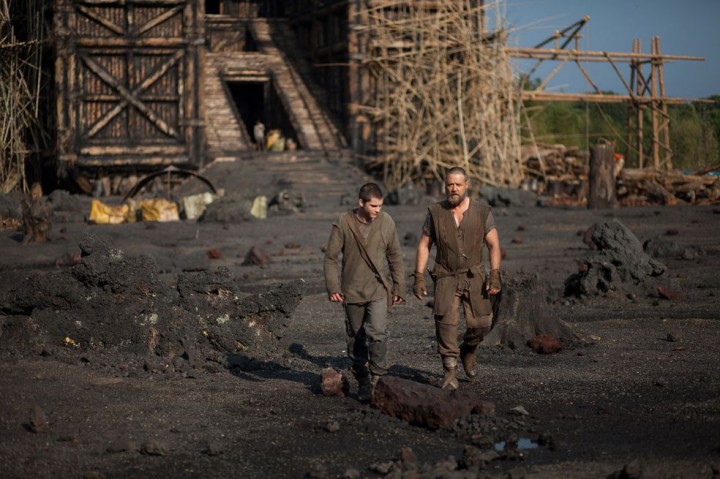
Noah is a very dark film, both visually and narratively. Aronofsky shoots a lot of the early part of the film with a highly contrasted style, almost poetic in many ways, giving Noah’s mission from God, and the construction of the Ark, a starkly visual experience. The magical forest which grows up around Noah to supply the timber for the Ark’s construction is a brilliant riot of greens standing out against the black soil and desolate landscape. Tubal-cain’s encampment, which is just a horror show of debauchery, cruelty, sin and despair, is rendered with almost smothering darkness – in fact, the latter half of the film, which occurs in and on the Ark during the post-flood phase, borders on incomprehensible darkness, with shadows and dimly lit scenes occurring with increasing frequency to the point it became more a distraction than a distinctive style.
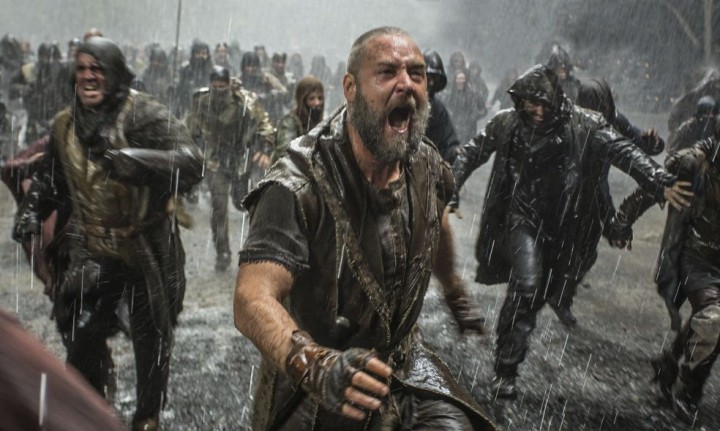
The arc Noah takes, from the opening faith in God to provide all for his family, to his eventual journey to believing he must kill his own family to cleanse the Earth of all sin (ie, mankind), is a harrowing one, and the script handles this aspect of the film really well. Both Russell Crowe and his on-screen wife Jennifer Connelly do justice to the burden of God’s commands (although Noah is wrong in his interpretation of God’s will, from what I understand), and as the core of the film they lift it above a fairly mediocre surround. Noah’s family, three boys and an imported British girl who looks a lot like Hermione Granger, are given fairly meaty arcs as well, although the film does struggle to provide each of them – particularly Shem and Ila’s problematic reproduction issues – with enough time within the film to really gel like they should. Logan Lerman’s arc, as the flying-solo Ham, is perhaps the best of the secondary plots within this film, and his conflict with Noah once a potential mate is lost to the rampaging horde of Tabul-cain increases significantly upon the Ark’s survival of the flood. Aronofsky generally does well with the variety of interpersonal conflicts here, but it’s primarily Noah we want to see (after all, it’s his movie, not Ham’s!) and to that end, Aronofsky delivers.
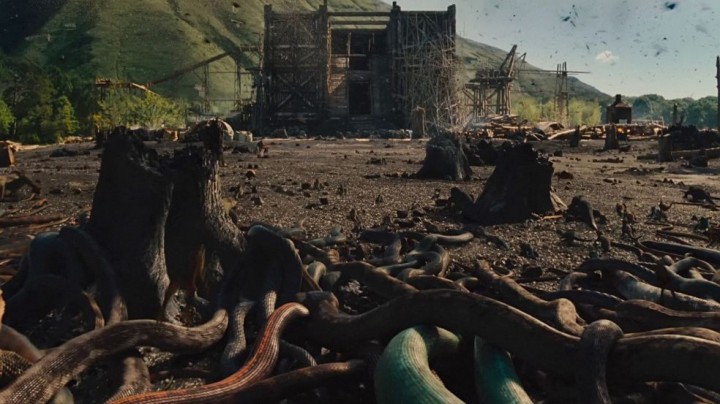
In any good story you need a quality villain, and in this regard Tubal-cain, a descendent of the first murderer Cain, son of Adam, fills the void. The original biblical account of Noah makes no mention of Tubal-cain, although I suspect this subplot is derived from apocrypha I’m unaware of (I didn’t get into Sunday School all that much!); Ray Winstone’s spittle-rending evocation of Tubal-cain as Noah’s nemesis doesn’t feel vindicated by the rest of the narrative’s upheaval, at least any more than simply a generic Bad Guy, and while I don’t think the film is particularly any better or worse for his inclusion, my feeling is that Winstone’s performance definitely adds some level of menace, a physical threat, to Noah’s endgame. Without giving the whole film away, the fact that Tubal-cain manages to slip aboard the Ark at the moment of the flood does feel a little “Hollywood hokum”, a factor one might lay at the feet of demanding cinema audiences who want a bad guy to hiss at, yet Winstone’s snarling, growling beast of a man manages to evoke at least some minor sympathy as the fate of humanity rests – at least in practical terms – on the shoulders of Noah.
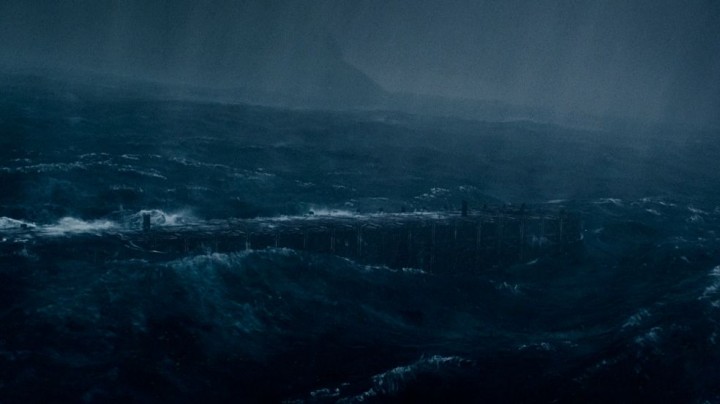
One of the key departures of Noah’s story in this film is the inclusion of a bunch of creatures known as The Watchers. Enormous stone giants, formerly fallen angels(*) cast down to Earth by God (apparently they wanted to help mankind repent of sin) and now “of the Earth”, aide Noah in his mission, helping him construct the Ark, and stand firm against the horde of Tubal-cain when it eventually attacks. While they certainly strike a visual chord, as far as “fitting” into the world of Noah they do seem a little too fanciful. And I guess this is the main problem I had with the film overall, is that at times it struggles to bring together the real and the divine; God’s divinity isn’t ever questioned, nor is it defied, so in that sense there’s no question that God exists and his power is absolute, yet Aronofsky misses his chance to really hammer this point home. In failing to do so, he leaves “the Creator” as simply a mystical omniscient power without context, and dilutes a lot of the more fanciful stuff as simply a belligerent supreme being running roughshod over humanity. In other words, if you’d never heard of God or had any conception of a god figure, and you watched this film, you’d be hard pressed to figure out what the hell is going on. It’s something I think Noah should have worked harder to avoid.
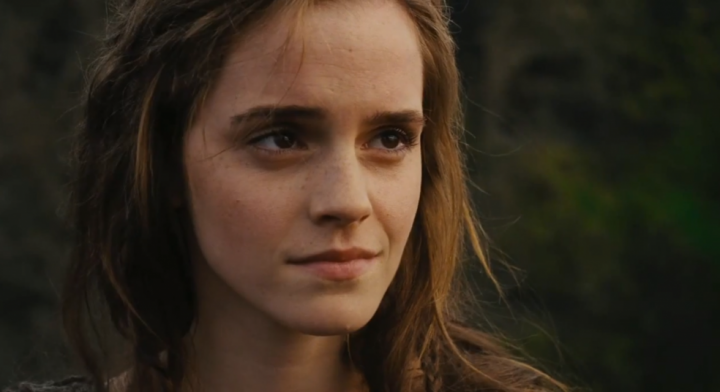
Noah works its magic through the lens of Hollywood’s grim-n-gritty realist mode. Blood, carnage, divine intervention and tremendously satisfying visual effects bring this scant story (the original text isn’t exactly overflowing with detail or dramatic depth!) to full-blooded life. For the non-believer the film plays as one enormous Disaster Epic, of the kind Roland Emmerich might be proud (come to think of it, I’m surprised Emmerich hasn’t through of approaching a biblical film for this very reason!), and for the faithful it represents a tempestuous, scatological “greatest hits” edition of the classic story. While I think the film-makers have generally done well with presenting Noah and his family with depth and a sense of emotional heft, the film’s uneven tone and heavy, melancholic nature will leave many viewers cold to its charms.

(*) Editor’s note – The Watchers seem to stem from the biblical word Nephilim, which are referred to in two sections of the Old Testament – many scholars believe the Nephilim were fallen angels of God who came to Earth and mated with humans, although no such reference is claimed within Noah’s narrative. In any case, it would appear Darren Aronofsky’s depiction of the Watchers is parallel to the Nephilim concept.
Related articles

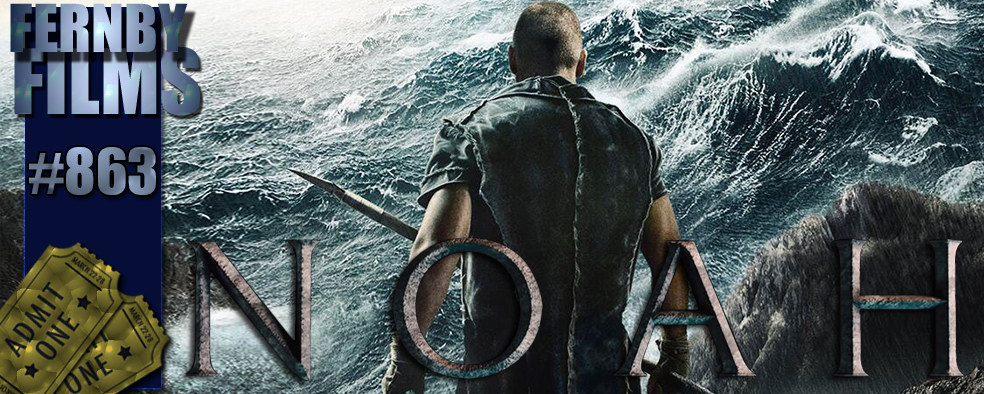










What did you think of Emma Watson's performance?
I thought she was pretty good, although I think her character was slightly mishandled in terms of what was demanded of her. Watson's always given 100% to any role, but this one felt a bit iffy to me. Should have been bigger, IMO.
I wish Aronofsky would have directed The Wolverine instead of this. The last thing we need is yet another Bible movie. At least, however, he did a good job with it, and didn't create a pandering piece of shit like most Hollywood Bible fare. I'll see it eventually. Nice review, Rodney.
Ha ha, yeah, this isn't exactly what I'd call a "Bible movie"…. it's probably as far from your Sunday School version of biblical Noah as Hollywood has ever been. It's a brave attempt, this film, and while there is plenty to fault alongside the good stuff, it's definitely worth a look to make up you own mind! Can't wait to hear what you think!
I agree with you completely. The film was beautiful to look at but far from being the masterpiece i hoped it would be. The plot was completely uneven, and the addition of Ray Winstone's character sneaking aboard the ark was absolutely pointless.
But.. those angels…. DAMN creative way to do that if you ask me.
Agreed – those angels were amazingly done, although they seemed to lack real oomph in the fight against the "evil" humans. Figured they'd put up a bit more of a fight, y'know? I thought Ray Winstone's role was overwritten, given more width within the film that he really deserved. And that whole sneaking on board the ark think just felt… wrong. Perhaps it's my old sunday-school teachings but only Noah and his family boarded the ark. I didn't mind the stuff about Noah going batshit crazy, though, I thought that was a nice slant on things. No doubt witnessing the ruin of humanity would drive many to the brink of insanity…. I know I would.